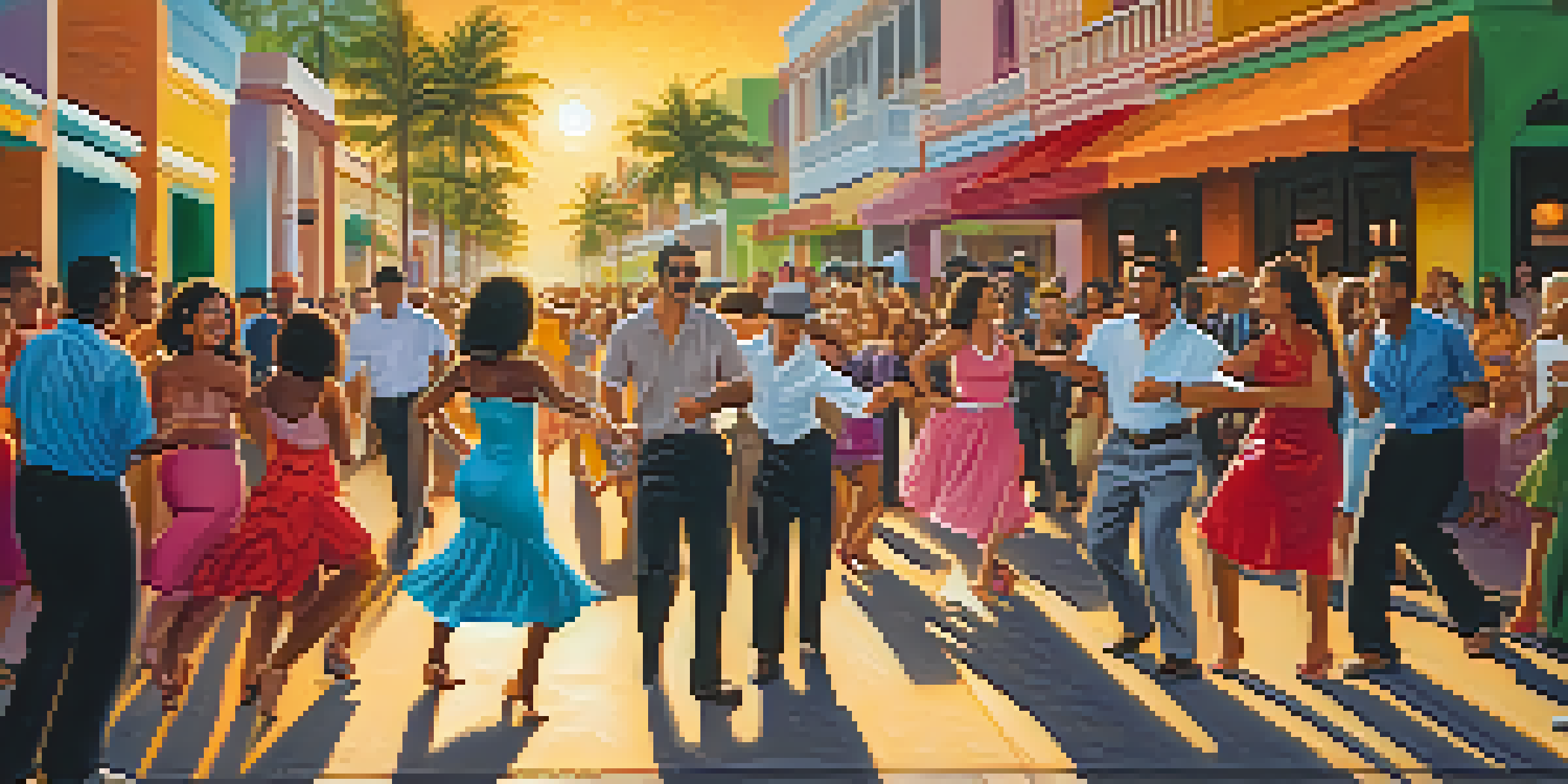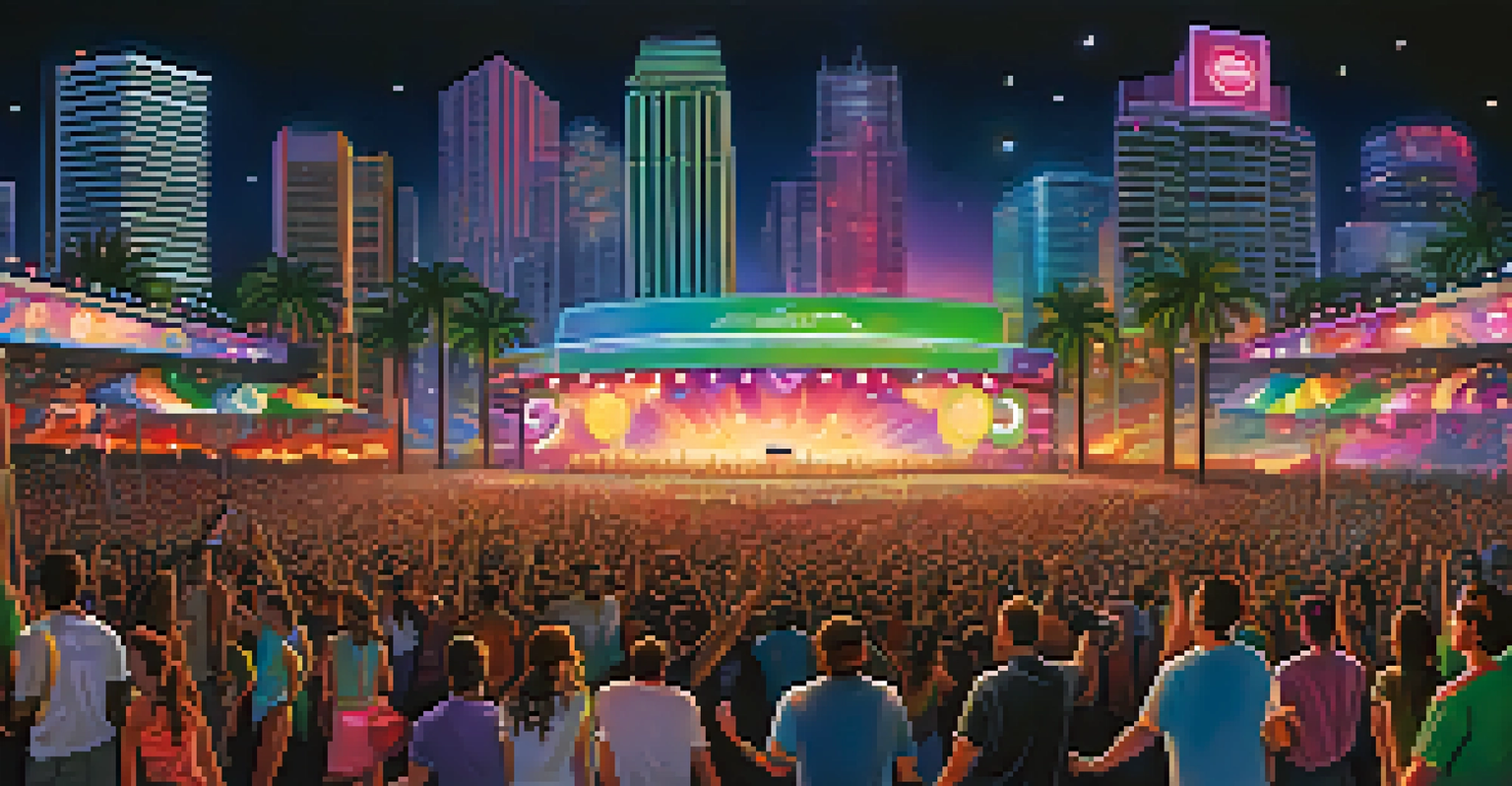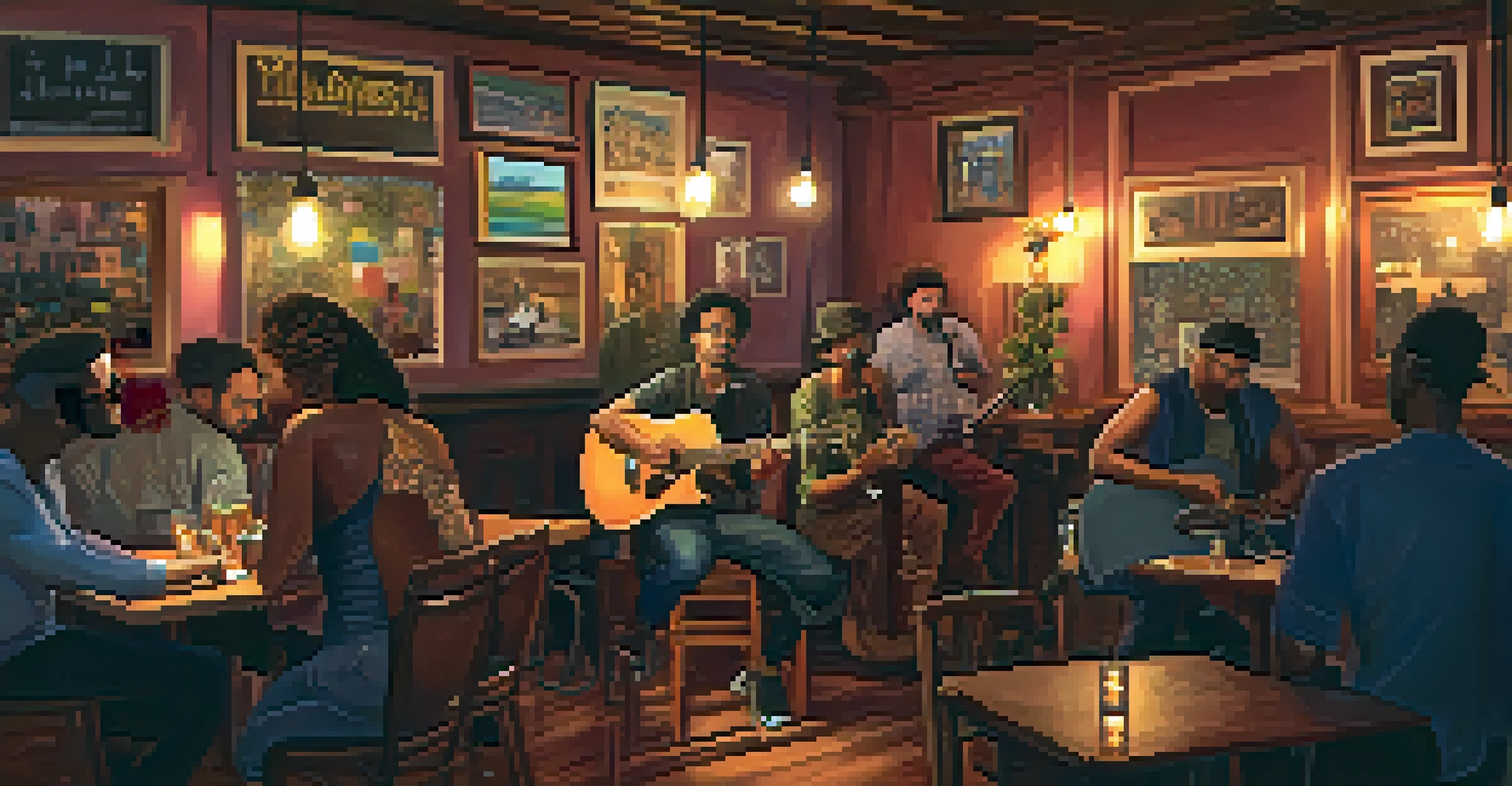The Role of Music in Miami's Cultural Diversity and Community

The Heartbeat of Miami: A Melodic Introduction
Miami is a city pulsating with rhythm, where music serves as a universal language connecting diverse communities. From the vibrant streets of Little Havana to the energetic sounds of Wynwood, the city's musical landscape reflects its rich cultural tapestry. This dynamic blend of genres, including salsa, reggaeton, and hip-hop, showcases the influences of various immigrant populations that have made Miami their home.
Music can change the world because it can change people.
The role of music goes beyond mere entertainment; it acts as a cultural bridge that fosters understanding and unity among residents. Community events, such as the Calle Ocho Festival, highlight this harmonious blend, bringing people together to celebrate their shared love for music. It’s in these moments that the true essence of Miami’s diversity shines through, revealing the stories and traditions that music carries.
As we delve deeper into this topic, we'll explore how music not only reflects Miami's cultural identities but also plays a pivotal role in shaping community interactions. From local performances to international music festivals, each note tells a story, creating a vibrant narrative that is uniquely Miami.
Cultural Influences: The Genres That Define Miami
Miami’s music scene is a melting pot, with genres that mirror the city’s diverse population. Salsa, with its Cuban roots, reigns supreme in local nightclubs, bringing people together on the dance floor. Meanwhile, reggaeton, influenced by Puerto Rican artists, has taken Miami by storm, resonating with the youth and bridging gaps between cultures.

Additionally, Miami is a hub for electronic dance music (EDM), attracting artists and fans from around the globe. The city’s famous Ultra Music Festival exemplifies this, showcasing how electronic music can unite diverse groups in celebration. Each genre adds a unique layer to Miami’s cultural identity, underscoring the importance of music in everyday life.
Music Unites Miami's Communities
Music serves as a powerful bridge in Miami, fostering connection and understanding among its diverse population.
As we listen to the beats that echo through the streets, it becomes clear that these genres are not just sounds; they are expressions of cultural heritage and resilience. Music enables communities to preserve their identities while also embracing new influences, creating a dynamic and ever-evolving soundscape.
Festivals and Events: Celebrating Musical Diversity
Miami is renowned for its vibrant music festivals that celebrate cultural diversity. Events like the Miami Music Week and the Calle Ocho Festival not only showcase local talent but also invite international artists to share their sounds. These gatherings foster a sense of belonging and pride, allowing residents to engage with their heritage and community.
Where words fail, music speaks.
Festivals serve as melting pots of music and culture, where people from various backgrounds come together to celebrate their differences and similarities. The energy is palpable, with attendees dancing, singing, and connecting over shared experiences. Through music, these festivals create a unique atmosphere that transcends language barriers, emphasizing unity amid diversity.
Moreover, these events often feature food, art, and dance, further enriching the cultural experience. They provide a platform for artists to express themselves and for communities to come together, fostering relationships that strengthen Miami’s social fabric.
Local Artists: Voices of Miami's Communities
Local artists play a crucial role in shaping Miami's musical identity, often drawing inspiration from their cultural backgrounds. Musicians like Pitbull, Gloria Estefan, and DJ Khaled have put Miami on the map, celebrating their roots while contributing to the global music scene. Their success stories inspire aspiring artists to embrace their heritage and share their voices.
These musicians often engage with their communities, using their platforms to uplift and empower others. Many participate in local events, workshops, and charity programs aimed at nurturing young talent. By giving back, they help cultivate an environment where music thrives and cultural narratives continue to evolve.
Local Artists Shape Cultural Identity
Local musicians draw inspiration from their backgrounds, using their platforms to celebrate heritage and uplift their communities.
In this way, local artists serve as ambassadors of Miami’s cultural diversity, weaving their personal stories into the broader narrative of the city. Through their music, they not only entertain but also educate, fostering a deeper understanding of the diverse communities that call Miami home.
Music as a Unifying Force in Miami
Beyond entertainment, music acts as a powerful unifying force in Miami. It breaks down barriers and encourages dialogue among diverse communities, allowing individuals to connect on a deeper level. When people gather to enjoy music, they share experiences that transcend cultural differences, fostering a sense of belonging.
For example, local jam sessions or open-mic nights provide platforms for artists from various backgrounds to showcase their talents. These events create spaces where people can share their stories and musical traditions, encouraging collaboration and mutual respect. As a result, music becomes a medium for cultural exchange, enriching the community as a whole.
Ultimately, the shared love for music cultivates an inclusive environment where everyone feels valued and heard. It’s this spirit of unity that makes Miami’s musical landscape not just diverse but also interconnected, highlighting the importance of music in building a cohesive community.
Music Education: Nurturing Future Generations
Music education plays a significant role in preserving Miami's cultural diversity for future generations. Local schools and community organizations offer programs that teach students about various musical genres and cultural traditions. These initiatives inspire young people to explore their heritage while gaining an appreciation for the music of others.
Through hands-on experiences, such as learning to play instruments or participating in group performances, students develop a sense of teamwork and creativity. These programs not only enhance musical skills but also promote cultural awareness and understanding among peers. As students collaborate on projects, they learn to value diverse perspectives and express themselves through music.
Festivals Celebrate Musical Diversity
Miami's vibrant festivals showcase a rich array of musical genres, bringing people together to celebrate their cultural differences and similarities.
Moreover, community events that showcase student talent allow young musicians to share their passion with a wider audience. This exposure nurtures confidence and encourages them to pursue careers in the music industry. In this way, music education serves as a vital tool for fostering cultural appreciation and ensuring the continuity of Miami’s rich musical heritage.
The Future of Music in Miami: A Cultural Evolution
As Miami continues to grow and evolve, so too does its music scene. The city's dynamic cultural landscape influences emerging artists who blend traditional sounds with contemporary styles. This fusion creates a vibrant and ever-changing musical identity, reflecting the city's ongoing transformation.
Technology also plays a crucial role in shaping the future of music in Miami. With the rise of digital platforms, artists can reach wider audiences, allowing for greater collaboration and innovation. This accessibility enables musicians to experiment with new sounds and share their cultural narratives on a global scale.

In conclusion, the future of music in Miami promises to be an exciting journey of cultural exploration and artistic expression. As the city embraces its diversity, music will continue to serve as a powerful tool for connection, community building, and cultural preservation, ensuring that the rhythm of Miami never fades.